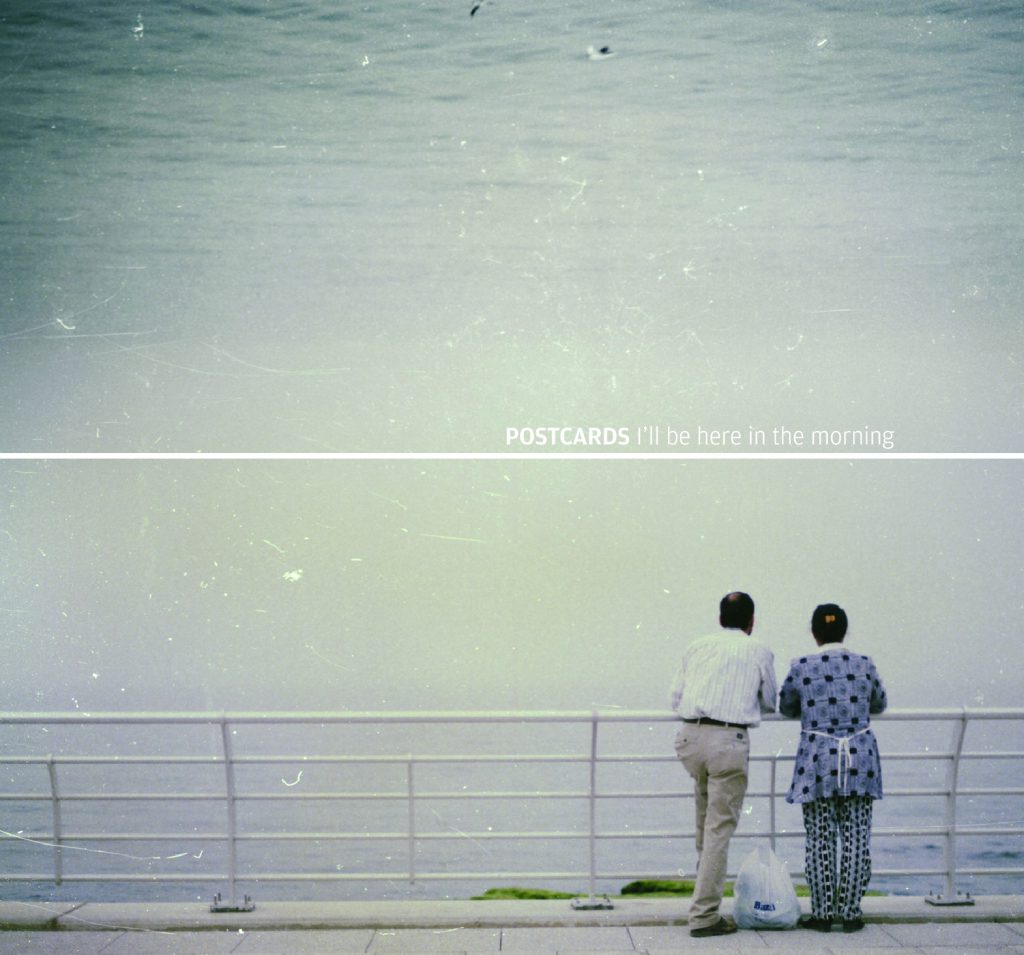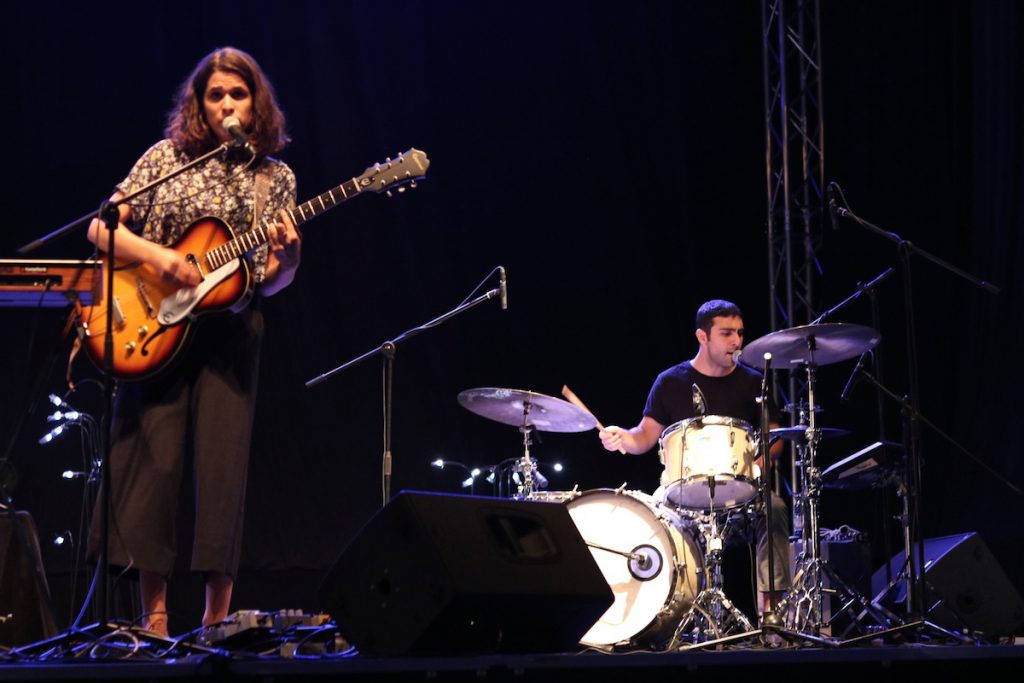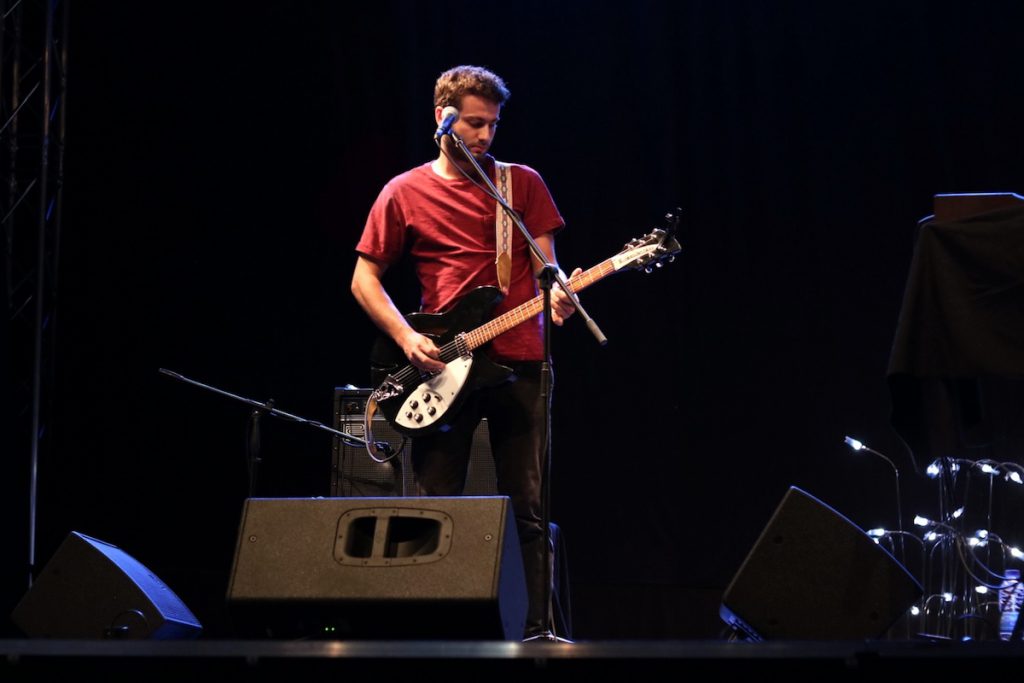Here’s a scenario. Someone snaps a picture of you with your hot pink Polaroid, the one you bought because the other colors were more expensive, and you forget about it. Thirty years later, your kids –if you’re into that– pull that same picture out of a dusty old box, laugh when you explain to them that you’re not the ugly one on the left, toss it back in, and move on with their lives. But you’re suddenly overwhelmed with nostalgia for a distant, ephemeral world. You don’t even remember any details, only how happy you were. When Postcards take the stage at the Hammana Artist House, the experience is similar. You never actually ground yourself, continuously ebbing and flowing into a distant world of dreamy, melancholic soundscapes.
This elaborate Polaroid metaphor was an attempt to avoid using a postcard metaphor, because that would have been even cheesier than the band forming in 2012 after a beachside camping trip where cousins Marwan Tohme (guitar, bass and backing vocals) and Pascal Semerdjian (drums, sampler, bass synth, and backing vocals) met Julia Sabra (lead vocals, guitar, synth, organ, and bass synth). Rany Bechara (bass) joined Postcards a few months later, but is currently studying abroad.
Their debut full-length album, “I’ll Be Here In The Morning,” shifts the band away from this “cute, hipster thing,” as their lead vocalist puts it, to “something a bit less in-your-face.” Internationally released in January, the album offers a more subtle, slow 
Postcards also seem effortlessly comfortable on stage in Hammana, performing a dreamy 15-song set of both their new and old material, to an audience that sways, smiles, or silently observes from the floor cushion provided for them. One older couple, seemingly in their fifties, even slow dances in the intimate outdoor space. The shift in their approach to music, which Sabra largely credits to their producer and manager Fadi Tabbal, is evident. Postcards have come along way since 2012, learning how to critically listen to music and drawing inspiration from their exposure to a wider variety of genres and artists.
“We started as people who were excited about music and who really wanted to do something and who were genuine, but now we’re actually music geeks, we listen to everything, and we know what we’re doing,” says Sabra, who anxiously sits with me for an interview in her Mar Mikhael home a week before the Hammana concert. She has to go find out if she’s received her travel visa, 10 days before the start of Postcard’s next tour.
Sabra speaks quickly and earnestly, stringing together all the thoughts in her head and repeatedly apologizing for any inconvenience that could cause when writing.
You all met back in 2012. Do you think that a lot has changed since then?
Everything. Everything’s changed.
In terms of your relationship with each other? The music scene around you?
A lot has changed but the music scene has gone through waves of ups and downs, I feel, in the last five years. When we started, we got motivated because of things like Beirut Jam Sessions, Wickerpark, Beirut Open Stage, and all the bands coming out like Wanton Bishops and Who Killed Bruce Lee. We didn’t know anything before that, so that definitely helped motivate us to write our own songs. We wanted to have this kind of following without being a cover band, but I feel like there was a big hype in 2012 and 2013 around “anything indie,” whatever that meant, and then it sort of went down and went back up.
I feel like now it’s more consistent. In 2013, if you had a small concert, there would be around 200 to 300 people and if you had a big concert, there’d be like 500 to 600 but now, no one can get 500 to 600 people except for Mashrou’ Leila and Adonis. I feel like getting 200 to 300 people now is great, because the following has diminished, but it’s more people who are actually passionate about the music. They’re not going there for the hipster thing.
So you think that’s a good thing, having a more passionate audience despite the smaller following?
Yes, of course. I mean, that’s how we see it. I don’t know if that’s how it is on the ground, but that’s what we felt over the past years. Also, our music has changed from this cute, hipster thing to something a bit less in-your-face and a bit more subtle. It’s cool to see that we have people who are interested in that because, obviously, there are real music fans in the country and it’s not just about wanting to wear a flower crown or whatever.
It’s changed and that’s evident with the new album you released this year, “I’ll Be Here In The Morning.” First of all, how’s the general reaction been to that?
It was unexpected, because we were kind of scared. We thought we were going to lose the crowd in Lebanon, the tiny crowd that we have, because we started as indie-folk and ukulele –and everyone loved the ukulele for no reason. I don’t ignore that part but we it’s just that we started and we had no idea. We liked things we heard randomly like Angus and Julia Stone, and we thought that was the best thing. Then, as we grew and learned, we actually became musicians.
We started as people who were excited about music and who really wanted to do something and who were genuine but now we’re actually music geeks and we listen to everything and we know what we’re doing. So, the music has changed with that. Not to say that using the ukulele is a bad thing but, I mean, the music became less naive and we’re more thoughtful about what we do. So this style is a bit more difficult, and it’s not a moody thing.
I don’t know, we felt it was not going to be well-received but, apparently, it was. The release was really cool, we’ve played a few concerts since then where there’s been people, and people loved the album. I’m sure some people hate it but we haven’t heard from them. It’s cool. In Lebanon, it’s always good to have a good homebase because that’s where you started and that’s where you live and it makes no sense to just go play abroad and not have anything here, no matter how much we travel –which we don’t do that much.
When you look back at your old work now, how do you feel about it?
Slight embarrassment, especially lyrically. But again, I feel like we approached it as though we wanted to try something and we didn’t know what. “Lakehouse EP” had the first songs we ever wrote, and whatever came out was there. Then slowly with the second EP [“What Lies So Still”], we worked a bit more. And then this one, I feel like this was our first real product. That’s why it’s an album and not an EP, because we all felt comfortable enough with it to be released as an album.
To me, it feels a lot sadder and more somber. Where is this coming from?
I think it came from growing up, I guess. Between 20 and 25, surprisingly, a lot of things changed. I know people in their 30s are going to laugh reading this but it does change a lot. You think that between 18 and 21, during university and everything, you’ve figured it all out and then another shock hits you after university. So that was a factor, and before [this album], lyrically, I don’t think I wrote anything that I felt. I don’t know how to explain this, but that’s why the lyrics were both happy and sad before. They followed a certain model that I didn’t really think about, but this time I thought “What am I going to write about?” and all these weird, sad things came out. I think the music followed –they follow each other, although the music is usually written first– but I think the guys were going through that as well, and they expressed it musically. I feel that even a lot of the music I listen to, although it sounds happy, is sad because life is horrible and, yeah.
Do you really believe that life is horrible?
I mean, not that, but I feel that music is also a sort of therapy. You write to get these things out. There are some happy moments in the album, but it’s always more reflection and thinking, and stuff like that, so it turns out to be sad.
Do you think this is also related to how you approach Beirut and view it as a city?
It affects it directly because we live here. Living here, you get used to a lot of shitty things happening, so of course it’s going to affect you in one way or another. I don’t have to sing about it overtly, all art that comes from Beirut has this weird vibe to it because it’s super fucked up and you can’t deal with it. At the same time you’re used to it and you love it, but you hate it and you want to leave and you don’t know what’s happening and there’s a lot of anger and stress and fear of the future, so of course that comes into play.


I think metal is a phase that a lot of people go through in Lebanon. I don’t know how it happened for them personally, but I know Pascal got hired by OAK, which was Allen Seif’s stage name. He came back from Australia and wanted to play in pubs and stuff, and he saw Pascal at a talent show. He basically taught him that you don’t have to play on seventeen pieces of drums to play drums. You can be a simple drummer, you can be subtle, you can be a part of the music, and I think that’s how Pascal switched from metal. They still listen to it sometimes but it’s not their favorite thing in the world. I think it’s a teenage thing, the metal, anger, rebellious phase. I didn’t go through it at all.
Does Rany still play bass with you?
He’s on a sabbatical right now, because he’s actually doing a Master’s in England. So, this year, we’ve been playing just the three of us. He’s still part of the band, but now we’re working as three for the time he’s not here.
I know that you also work with Fadi Tabbal. So many musicians in the local indie scene are linked to him in some way or another.
He’s the guru, that’s why.
What is it about his work that you liked?
It’s not like we wanted to pick a producer and we picked Fadi. At the time, we didn’t know anything. Beirut Open Stage gave us the chance to record for free at Fadi’s studio. Fadi’s the best kind of mentor because, even if it’s a small band that he doesn’t really work with like when we started out, he just pushes you to do the best that you can in the moment.
Maybe at the time, he saw the potential for us to become something more but he wasn’t like “throw the ukulele and start doing harmonies” or whatever. He follows where you’re going and pushes you. As we developed our relationship with him, and became really good friends and he became our manager, it’s just him teaching us about how to listen to music and how to appreciate sound in music and how to think about writing and giving us a lot of music to listen to and just giving us background. We were super into folk at the time. He was like, “You guys know the shitty folk you hear on the radio, but why don’t you go back to the history, to what these artists were actually like?” So we went back to the first folk artists and all of that.
I think he does that with all the bands he works with, whether he produces them, just records them, or just knows them. He’s just that kind of person, and he doesn’t force himself on you. And obviously, he’s been in this for so long. He’s an insane musician and producer. I can talk for hours about Fadi, because he’s really the best and it’s really cool that we get to work with him so closely.
So Fadi doesn’t push you, but do you think there are any creative rules that you set for yourselves in the studio?
There’s always some sort of a reference, especially for sound. “We don’t want the drum to sound like this, we want it to sound like that,” but there’s no pillar we follow. The music we make is very much inspired by the music we’re listening to. It’s not a direct reference, you don’t hear a song and say this sounds exactly like [one of ours], but when we’re stuck, it helps to listen to a song and think about the way they thought about arrangements or melodies. We were doing just that. I mean, now we’re writing new songs and it’s turning out to be a bit more punky. We’re listening to vocal melodies to think about how to write those but it’s never something set in stone. Sometimes we just experiment, sometimes something new comes up. You know, you have your references but you also do your own thing. So our references are the albums we like or the artists we look up to.
So you’re writing new songs.
Yes, always.
What else is coming next?
We have two shows in July, in Germany. Then we’re coming back and going on tour for the entire month of August. I think we might be recording in December or something, because we’re already writing a lot of songs.
Speaking of tours, I know that you also opened for Beirut and for Angus and Julia Stone. Was there anything you learned or took out of that?
Not at all, actually. I’m sorry. It’s not like you get to hang out with them all the time. I mean, Beirut were super nice and we ended up going for drinks afterwards but the thing is, when you meet all these musicians, you don’t end up talking about music. You just end up talking about anything else.
What happened is that we opened for Beirut and for Angus and Julia Stone when we were on the verge of outgrowing their music. I don’t mean this in a condescending way, but we were over it. Beirut was the limit. I was super excited but I didn’t listen to their albums anymore, although I still loved them. When we opened for Angus and Julia Stone, I just didn’t care, but they were good live. They had a good band. If it had happened two years earlier, we would have been crazy and probably would have had a lot of things to tell you, but it was normal. Beirut was exciting, but Angus and Julia Stone was just chill. It was weird backstage, because they didn’t really talk to each other.


No. Let’s just wait and see how far we make it but I don’t think so. There’s a family vibe going on. Pascal and I go out with each other, Marwan is going out with Rany’s sister, and Pascal and Marwan are cousins. So it’s already a family. Hopefully, it won’t get to that point.
You said you were on the verge of getting over the music and not listening to Beirut or Angus and Julia Stone. So, what are you listening to right now?
[Here, Sabra grabs the iPod off her work desk, switches it on, and scrolls through her music.]
There’s so many things, let me check my iPod. I’m going to give you very specific albums because there’s a lot. I’m listening to Broken Social Scene, a lot. There’ also Richard Dawson. He came to Lebanon and I watched him live and it was the best thing I ever saw live. He’s this folk artist and he has this pseudo-weird guitar playing, and he has insane melodies. The way he sings is just –you should listen to him. Atlas Sound, a lot. Yeah Yeah Yeahs, just the one album “Yeah Yeah Yeahs.” That’s what I’m listening to but the guys are somewhere around that.


